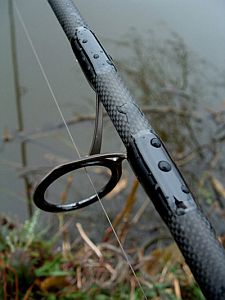There’s never been more choice when it comes to quality monofilament line for specimen carp fishing, with most tackle manufacturers having their own ranges to suit all budgets, but what should you go for; there’s a huge difference in price and it’s not always clear what the benefits are with one over another?
It’s important to spool your lines with a decent mono, as lets face it, it’s the only thing keeping you in contact with the fish, but it’s about getting a balanced set up – there’s little point spooling up with fifty quids worth of line only to put a ten pence hook on the end!
You want your line to have good strength in order that it can stand up to the attentions of a big fish. However, it’s easy to overdo it – whack out on your small club water with 30lb breaking strain tow rope and the fish will see it a mile away! Likewise a low breaking strain will remain hard to pick out, but will it deal with the angry fish on the end trying to bore down into the snags!? For the novice angler I’d suggest a starting point of 15lb breaking strain for most lakes you’ll be faced with, then as you gain experience bringing it down to 12lb. I do most of my static fishing on 12lb and often lesser breaking strains of 10lb and 8lb when stalking.
 The diameter of the line is also important. The thinner the line is, the easier it will cast, so if distance is important to you, then you need to compare the line diameters for the breaking strain offered, as there can be quite a lot of difference. For me, one of the most important factors is abrasion resistance, which is really to do with how the line stands up to all the bits and pieces it comes into contact with on the lake bed, both when casting and retrieving your rigs, and also when you are playing a fish. I do a lot of close quarter stalking in and around areas where there might be potential snags, especially in shallow water, so it’s important to know my line is going to stand up to the rigours of the fight without any problems.
The diameter of the line is also important. The thinner the line is, the easier it will cast, so if distance is important to you, then you need to compare the line diameters for the breaking strain offered, as there can be quite a lot of difference. For me, one of the most important factors is abrasion resistance, which is really to do with how the line stands up to all the bits and pieces it comes into contact with on the lake bed, both when casting and retrieving your rigs, and also when you are playing a fish. I do a lot of close quarter stalking in and around areas where there might be potential snags, especially in shallow water, so it’s important to know my line is going to stand up to the rigours of the fight without any problems.
Stretch is one thing that you’ll get with all mono’s – some more than others – and the more line you have out, the more stretch you’ll get when you suddenly need to wind down and make enough contact to turn a big fish. Personally, I like a bit of stretch as it gives me a damper when playing hard fighting fish I’ve hooked inches from the bank! When fishing at extreme distance, then it’s something I pay a lot more attention to.
So, now we know what we need our line to do, which should we get? Well, my best advice would be to consider how often you’re going to be spooling up. Every few sessions I’ll strip back about ten feet of line from my reels and disregard it (safely!) so that any weak points around the rig and or any abrasions I’ve missed will not cause me to lose a fish. I’ve seen so many people hit into fish and suddenly have main line breakages without any apparent reason – it’s often because a previously missed impairment on the line has gone unchecked. This can and will happen on any line – from the cheapest to the most expensive, so it’s vital you are always checking for weak spots and potential problems. Five minutes spent stripping back every so often will help to ensure there’s always fresh line coming through on your spool so that you’re always fighting fit.
As a result of frequent stripping back, I’ll get through line quite quickly, and will sometimes spool twice a year to ensure there’s always enough line on my spool. I have about six or eight rods in regular use, so this could get quite costly were I using a top end line on all of them, and hence my point; use a cheaper line properly, look after it and maintain it well, and it should serve you well in return. Yes, some of the top end lines are great, but if you never check them or maintain them, you’re no better off. Most of my fishing is done at short to medium range and I use some of the cheapest lines out there – the only difference being that I look after them well. Lines like Daiwa Sensor will perform ’til the cows come home if looked after correctly, and there’s new value for money lines coming to the fore all the time; the new Shimano Aero specimen mono, for example, at around £9.00 for a quarter pound spool.
Do the top end lines outperform them? In some areas definitely, but you need to ask yourself are you getting it because it says it’s the best, or because you know it’s what you need to aid your particular type of fishing. I’ve used a lot of top end lines in the past and for my style of fishing, rarely do they make enough of a difference in performance to merit me buying them time and time again. The one thing for sure is that there’s no shortage to choose from, so again, my advice would be to check out some reviews, try to find those written by people fishing in a similar fashion and see what they have found works well for them. This way there’s a greater chance you’ll find the perfect match.
Julian Grattidge
www.Northwestcarp.co.uk
September 2011




















